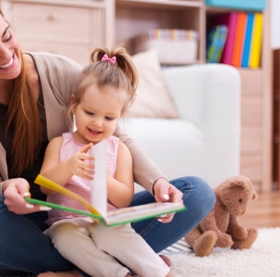Article at a Glance
Teachers aren’t the only ones concerned about reading. The American Academy of Pediatrics (AAP) recently released guidelines for the first time ever about the importance of reading to our children. Under the new guidelines, pediatricians are encouraged to advise parents on the importance of reading to their children.
Why is reading important to pediatricians? During those first three years of life the brain undergoes important changes. Studies show that reading together is vital to fostering healthy brain development during this phase. Reading together also helps strengthen parent-child relationships.
One in three students are entering school without the pre-literacy skills they need. Studies have shown that reading out loud with your children is one of the best ways for them to learn language, develop early literacy skills, and to help support early brain development. Children who are read to regularly start school with better language skills and a greater interest in reading.
Reading proficiency by the third grade is the most important indicator of whether or not a child will graduate from high school. It is also an indicator of how successful people will later be in their careers. Unfortunately, two out of three children are not developing the needed language proficiency by the end of third grade. The gap is even wider among low-income families.
Reading together promotes parent-child interaction as you talk about what you see on the page, point things out, and discuss what is happening. Children need that important, daily face time as they engage in conversations and develop relationships with their parents. Books help create a nurturing, interactive relationship where children can develop important cognitive, language, and social-emotional skills.
Cut down on screen time: Electronic media is competing for the time we have to spend interacting with our children. Watching TV together is very passive and requires little to no interaction. Help your family limit their electronic media and instead use that time to interact with your family.
Start early: The earlier you start reading to your child, the better. Babies love books too!
Do it daily: Make reading together a habit and a priority. For it to be most effective, you need to read to your child on a daily basis.
Make it fun: Find shared-reading activities that are fun for both you and your child. Be realistic about your expectations. Children aren’t always going to sit there and listen quietly. Sometimes your baby may even chew on the book! But be consistent and capture even those small moments when you can. If you have a wiggler, try reading to them while you child is on the move.
Make books available: Look for ways to have plenty of books in your home. Libraries often sell used books or garage sales are a great place to pick up books for cheap.
Find books that are age appropriate: Children will be more interested in books that fit their developmental stage. Most librarians can help you find books that are a good fit for your child.
Make it interactive: When reading to your baby, take time to point at and name pictures. As your child gets older, ask about what you are reading or see if your child can complete rhymes in a book.
More Information:
Parents who read to their children nurture more than literary skills (AAP)
Raising Good Readers Begins at Home
